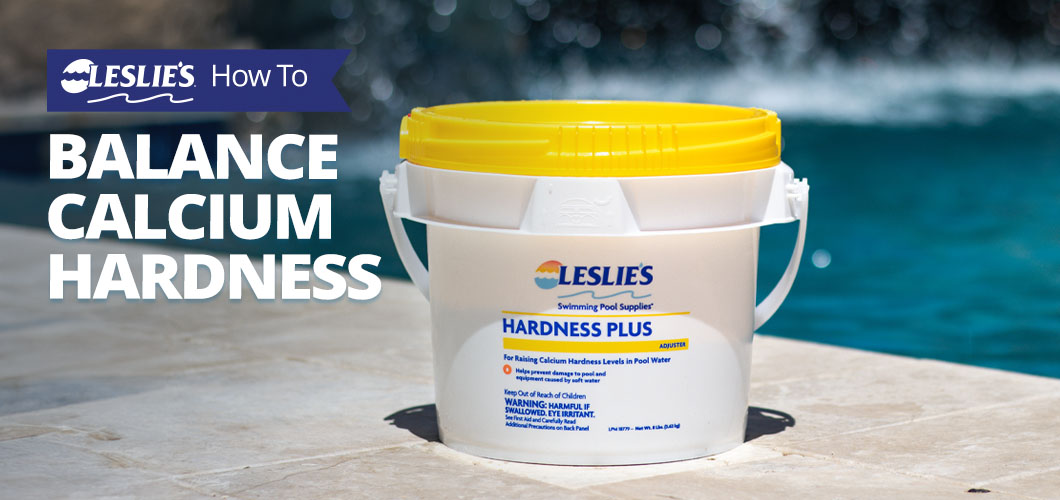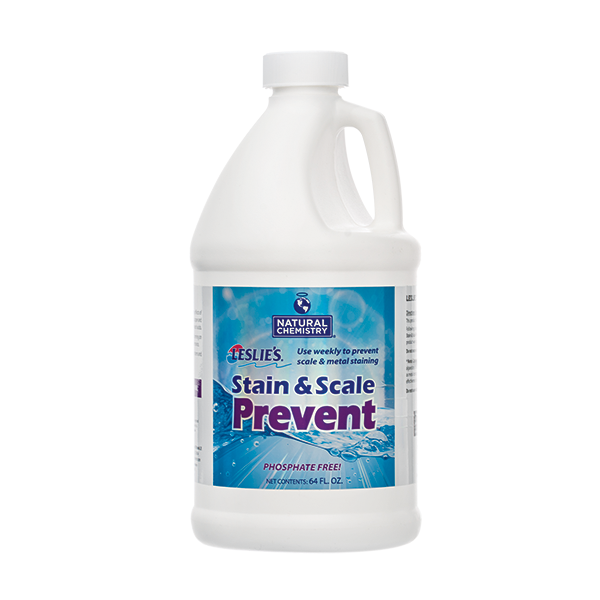
How to Balance Calcium Hardness in a Pool
If you've ever wondered why your hands get so dry after washing them, chances are you live in a place with hard water. "But water is a liquid, how can it be hard?" That's a great question! The terms "hard" and "soft" refer to a water's calcium content, also known as Calcium Hardness. The higher the amount of calcium, the harder the water. And vice versa. Your swimming pool requires a certain amount of calcium to maintain an ideal water chemistry.
Why is Calcium Hardness Important?
For your pool to function properly, its Calcium Hardness level needs to be within a set range. The optimal range for Calcium Hardness is 200–400 ppm (parts per million). If your pool's calcium level gets too high or too low, your pool and pool equipment can be damaged. Managing your pool's Calcium Hardness correctly is the key to preventing major pool issues.
Testing for Calcium Harness in Your Pool
Regularly testing your pool water chemistry levels will keep you one step ahead of any issues that may be brewing. We recommend testing your pool at least once a week, with additional testing after heavy use or changes in weather. Additionally, be extra vigilant of Calcium Hardness levels if you live in an area with naturally high calcium content.
PRO TIP: Before you can treat any suspected Calcium Hardness dilemmas in your pool, you must first test and balance other aspects of water chemistry. Always balance pH and Total Alkalinity first, as they will affect the ability of calcium in the water to form scale or corrode pool surfaces. Once the other aspects of chemistry are balanced, you can address Calcium Hardness.
How to Balance Soft Water
Things that are soft are usually good, right? After all, there are soft beds and soft puppies. Unfortunately, that is not the case regarding water softness. Soft water, or water with low Calcium Hardness, is actually more damaging to your pool than hard water.
Without routine water testing, it can be difficult to detect low Calcium Hardness in your pool. The lack of calcium won't change the look of the water much, but it will affect your pool structure and equipment. Look for the following indications of low Calcium Hardness, but test the pool water to confirm.
Signs of low Calcium Hardness in your pool
- Metal Corrosion: Calcium is actually a type of metal. When levels are too low, the corrosive nature of soft water can cause it to go after the metals in your pool, including handrails and equipment. In addition, Calcium Hardness often goes hand in hand with other aspects of water chemistry, such as Total Alkalinity or pH. If the Calcium Hardness in your pool is too low, other aspects are likely to be, as well.
- Concrete and Plaster Corrosion: As pool water becomes more corrosive, it attempts to balance itself by leaching calcium from plaster, concrete, grout, tiling, or other similar surfaces. This causes pitting and delaminating, which essentially means the corrosive pool water eats away at the structure of your pool.
- Foamy Water: Soft water increases the likelihood of issues with pool water foam. In addition to balancing Calcium Hardness, there are a few other ways you can combat foamy pool water.
How to raise Calcium Hardness in your pool
If you discover the Calcium Hardness level is below 200 ppm after testing, you will need to raise the level. Thankfully, raising the Calcium Hardness levels in your pool is fairly simple. To do so, you will need calcium chloride, also known as hardness increaser, or Leslie's Hardness Plus. Follow the dosing instructions carefully to ensure you add the right amount to your pool water.
PRO TIP: It can take time for the hardness increaser to fully incorporate into the water. Don't be concerned if your pool water chemistry doesn't bounce back immediately after adding it. Refer to product label instructions for more information.
How to Balance Hard Water
Hard water, or a high level of calcium, is much easier to notice than soft water. If the Calcium Hardness is exceedingly high — above 600 to 800 ppm — your pool water will likely be cloudy. This happens because the water has become saturated with calcium, and is unable to absorb it into solution. In addition to the cloudy water, look for the following signs if you suspect high levels of calcium in your pool.

Signs of high Calcium Hardness in your pool
- Scaling: When pool water becomes saturated, the excess calcium will look for a new place to go. Scaling happens when calcium attaches itself to other areas in your pool, like the lining, plumbing, and filters. A sequestering agent, such as Leslie's Stain & Scale Prevent, will help to prevent pesky stains and scale.
- Reduced Chemical Effectiveness: Because the pool water is saturated with too much calcium, other chemicals may not be able to be absorbed. This can lead to a domino effect of chemical buildup and increasing Total Dissolved Solids (TDS) as you try and fail to rebalance the water.
- Skin and Eye Irritation: Free-floating calcium can be irritating to your skin and eyes. If you're battling high Calcium Hardness, it may not be comfortable to swim in the pool, and your skin may feel dry and itchy once you get out of the water. It's very similar to taking a shower in extremely hard water — not pleasant!
- Cloudy Water: Water that's saturated with calcium can take on a cloudy appearance, which isn't safe for swimming.
How to lower Calcium Hardness in your pool
Unfortunately, lowering the Calcium Hardness level in your pool is not as simple as increasing it. Not by a long shot! If the levels get too high in your pool, consult with a pool professional about partially draining and refilling the pool with fresh water to bring the levels down.
To prevent damage to your pool, we recommend draining and replacing one foot of water at a time until you reach the desired levels of Calcium Hardness. If you don't have a main drain on the pool that can assist in the draining process, use a submersible pump or a pool cover pump to help you out. For tips on draining your pool safely, check out our blog post, Pool Draining 101. You can also call or stop by your local Leslie's to ask about our pool draining services.
Regulating Calcium Hardness is all about maintenance. Testing your pool water at least once per week will help you stay on top of your pool's chemistry levels and avoid major issues. With the right steps, you can stop chemistry problems in their tracks, and get the most out of your beautiful pool!
Bring a pool water sample to your local Leslie’s to take advantage of our always free in-store AccuBlue water test and customized treatment plan. We'll help you diagnose the problem, and develop a specific plan for your pool.